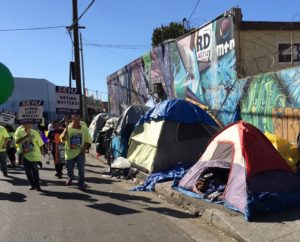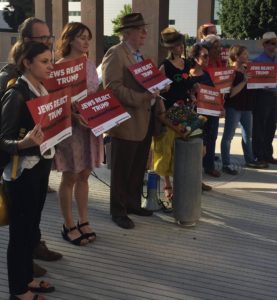In terms of the Jewish year, which is in tune to the weekly readings of the Torah, we are now between lech lechah and vayera. The former portion, lech lechah—which literally means “go forth”—is named for God’s famous command to Abraham to do just that: “go forth from your land, from your birthplace, from your ancestral home, to the place I will show you.” Abraham was not told where he was going. God did not say: Go to Canaan. He was going to an as yet unnamed place. All the important things that happen in the book of Genesis, happen at places that are only named once the important things happen there. Only after seeing God in a dream and receiving a covenantal promise, for example, is Jacob able to name that place Bet El, the house of God.
So we just passed the Shabbat of going out, going forward. We went with Abraham and Sarah and the movement that they created toward a place that would be defined by what they would do there.
This week’s portion vayera/“and [God] revealed [Godself]” is named for the moment in the opening sequence of the portion where God is paying a sick call to Abraham who is healing from his circumcision.
Abraham is sitting in front of his tent. In the rabbinic imagination Abraham’s tent was opened to all sides in order to welcome wayfarers. Abraham was sitting and waiting for travelers when God stopped by for a visit. However, as they were chatting about this or that, Abraham spotted three travelers, left God, ran to greet these wanderers, and asked them to rest a while in his tent.
There are two ways to live in the world. One way is to live with the doors and the windows closed and the other is with the doors and windows open. If you live with the doors closed, you concentrate on the needs of your house—security, food, shelter, income. These are all important things, but the area of your concern stops at the bolted doorway. In the rabbinic imagination, having your concerns be bounded by the walls of your house is called Sodom. (The story of Sodom is also in this week’s portion. If you don’t know the story, they were bad and God destroyed them.) The Rabbis imagine that the sin of Sodom was the elevation of private property to the level of a religious belief. God destroyed Sodom after hearing the cry of a young woman being tortured by the Sodomites for the sin of sharing her food with another person. So Sodom is the radical end of “What is mine is mine, and what is your is yours.”
Abraham is the opposite of that. The doors of his tent are open.
But there is more. And here I have to go slightly into the weeds.
In discussing the laws of Shabbat, the rabbis define four different types of domain: private, public, private which is not private, and public which is not public. A private domain is your house. A public domain is the street or a highway. A private domain which is not private is the porch outside your store which is open to the public but not that many people can gather there at once. A public domain which is not public is a valley, or an unfenced, untended field where lots of people could theoretically gather but it is not easy to do so. Okay out of the weeds.
The point is that while one is not allowed to transfer an object on the Shabbat from the public domain to the private domain, one can transfer an object from a private to a “private domain which is not private” and then to the public domain. And so on. In other words, and this is important, the rabbis imagine a more fluid movement between private and public.
During this campaign, when we went canvassing, and we knocked on peoples doors, and engaged them in a political conversation, we were breaching the chasm between public and private. We were engaging people whom we did not know before in conversation.
When we held an action on the street we were making a claim to that public space and making it a space which was not totally public. We were saying that the boundaries of our house, and perhaps our neighborhoods are not the boundaries of our humanity or our responsibility. We were standing with Abraham and moving fluidly between the public and the private and making a claim on others to equally move from the security of their private spaces into the community of those who inhabit the public spaces which are not public, the private spaces which are not private.
The way we get from here to there, if there is a more perfect and just community, city, state, and country, is that we have to leave our tent—even if God dropped by for a chat—to take responsibility for the wanderer on the public road.
Although we are now in a liminal space—we are grieving our losses, and unsure what the future holds; we are terrified because the country will be run by a person grossly unqualified, whose campaign was rife with hatred and venom, and yet we do not know what policy shape that venom will take—we should look back and embrace the fact that many of us did try to claim the public spaces as our responsibility. This is the ground that future progress may be built upon.
We must now take our movement and go forth to a place which hopefully we will be able to name justice.
__________________
Walking the Talk
There are a number of ways that you can start walking toward justice.
- Support organizations that protect women’s health such as Planned Parenthood.
- Support organizations that protect immigrants’ rights such as CHIRLA.
- Join and work and support organizations whose mission is creating justice such as Bend the Arc, ACLU, CLUE.
- There are many ways to resist injustice, racsim, antisemitism and the rest of the Trump agenda. Please use the comments to share those which you think are most urgent.

Beautiful! Kol HaKavod!
Thank you.
THANK YOU. BE WELL AND CONTINUE BEING YOU.
RITA LOWENTHAL